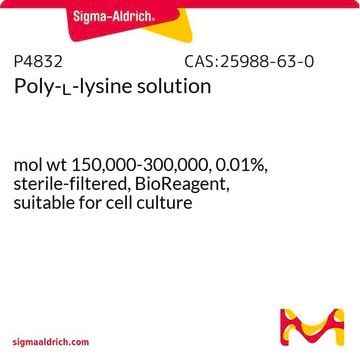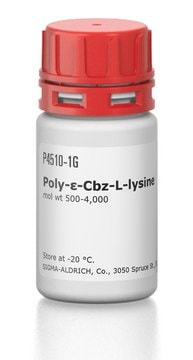P3513
Poly-L-lysine, succinylated
mol wt >50,000
Synonym(s):
Modified Lysine Copolymer
Sign Into View Organizational & Contract Pricing
All Photos(2)
About This Item
Recommended Products
form
powder or solid
mol wt
>50,000
color
white to faint yellow
application(s)
cell analysis
storage temp.
−20°C
Looking for similar products? Visit Product Comparison Guide
Application
Succinylated poly-L-lysine has been used to bind (Gly)3-Arg-bradykinin to study its hydrolysis by brain endopeptidases and pancreatic proteinases.
Biochem/physiol Actions
Poly-L-lysine is a cationic polymer. It is mainly used for immobilizing cells to glass substrates or negatively charged substrates.
An intermediate for coupling proteins to poly-L-lysine.
Analysis Note
Molecular weight based on precursor poly-L-lysine viscosity. Also assayed by MALLS.
Other Notes
For additional technical information on polyamino acids please visit the Polyamino acid FAQ resource.
Storage Class Code
11 - Combustible Solids
WGK
WGK 3
Flash Point(F)
Not applicable
Flash Point(C)
Not applicable
Personal Protective Equipment
dust mask type N95 (US), Eyeshields, Gloves
Certificates of Analysis (COA)
Search for Certificates of Analysis (COA) by entering the products Lot/Batch Number. Lot and Batch Numbers can be found on a product’s label following the words ‘Lot’ or ‘Batch’.
Already Own This Product?
Find documentation for the products that you have recently purchased in the Document Library.
Customers Also Viewed
Susceptibility of a Peptide Derived from Bradykinin to Hydrolysis by Brain Endo-oligopeptidases and Pancreatic Proteinases*
Antonio C. M. Camargo
The Journal of Biological Chemistry, 254(12), 5304-5307 (1979)
Effects of poly(L-lysine) substrates on attached Escherichia coli bacteria.
Colville K
Langmuir, 26(4), 2639-2644 (2010)
Topographical Pattern Dynamics in Passive Adhesion of Cell Membranes
Alina Hategan
Biophysical Journal, 87(5), 3547?3560-3547?3560 (2004)
V S Trubetskoy et al.
Nucleic acids research, 27(15), 3090-3095 (1999-08-24)
DNA can be condensed with an excess of poly-cations in aqueous solutions forming stable particles of submicron size with positive surface charge. This charge surplus can be used to deposit alternating layers of polyanions and polycations on the surface surrounding
Sofia Helena Linnea Frost et al.
Cancer biotherapy & radiopharmaceuticals, 26(6), 727-736 (2011-11-18)
Avidin-coupled monoclonal antibody MX35 (avidin-MX35) and astatine-211-labeled, biotinylated, succinylated poly-l-lysine ((211)At-B-PL(suc)) were administered in mice to assess potential efficacy as an intraperitoneal (i.p.) therapy for microscopic tumors. We aimed to establish a timeline for pretargeted radioimmunotherapy using these substances, and
Our team of scientists has experience in all areas of research including Life Science, Material Science, Chemical Synthesis, Chromatography, Analytical and many others.
Contact Technical Service






